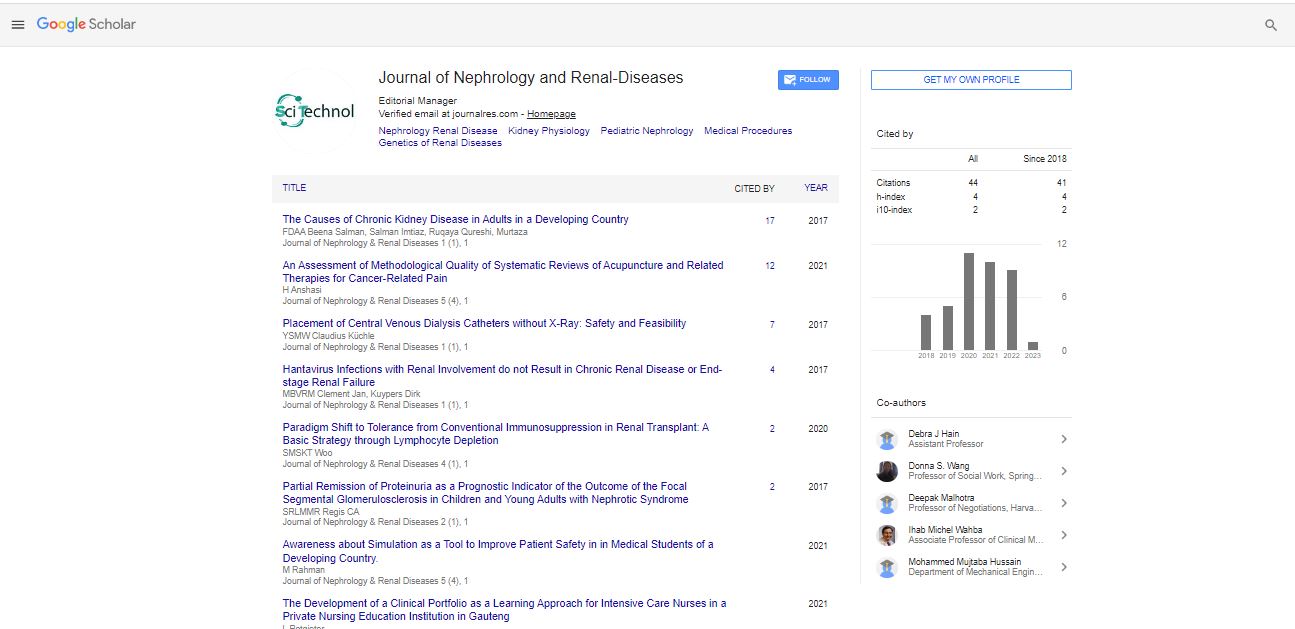Commentary, J Nephrol Ren Dis Vol: 7 Issue: 3
Therapeutic Advances in Renal Immunology: Current and Future Prospects
Robert Mendeley*
1Department of Transplantation Immunology, University of Heidelberg, Heidelberg, Germany
*Corresponding Author: Robert Mendeley,
Department of Transplantation
Immunology, University of Heidelberg, Heidelberg, Germany
E-mail: mendeley.r@med.uni-heidelberg.de
Received date: 28 August, 2023, Manuscript No. JNRD-23-117631;
Editor assigned date: 30 August, 2023, PreQC No. JNRD-23-117631 (PQ);
Reviewed date: 13 September, 2023, QC No. JNRD-23-117631;
Revised date: 21 September, 2023, Manuscript No. JNRD-23-117631 (R);
Published date: 29 September, 2023, DOI: 10.4172/2576-3962.1000043
Citation: Mendeley R (2023) Therapeutic Advances in Renal Immunology: Current and Future Prospects. J Nephrol Ren Dis 7:3.
Description
Renal immunology is the branch of immunology that focuses on understanding the immune system's role in kidney health and disease. The kidneys, like other organs, are subject to immune-related processes and conditions, both in terms of immune protection and the potential for immune-mediated damage. Renal immunology explores the interactions between the immune system and the kidneys and plays a vital role in understanding and managing various kidney-related conditions. Renal immunology plays a critical role in the field of kidney transplantation. Understanding the immune response to transplanted kidneys and developing strategies to prevent rejection is crucial for the success of kidney transplant procedures. Researchers in renal immunology study both the innate and adaptive arms of the immune system and their interactions within the kidney. The innate immune system provides immediate defense against pathogens, while the adaptive immune system generates specific responses to antigens, including those originating from the kidney.
Therapeutic advances
Autoimmune kidney diseases, such as lupus nephritis and glomerulonephritis, occur when the immune system erroneously targets the kidney tissues. These conditions often lead to inflammation, tissue damage, and progressive renal dysfunction. Therapeutic advances in autoimmune kidney diseases are expanding the treatment options and improving outcomes for affected individuals. Traditional immunosuppressive drugs, such as corticosteroids and cyclophosphamide, have long been used to manage autoimmune kidney diseases. However, advances in immunosuppressive therapies have introduced more targeted and less toxic medications. For instance, mycophenolate mofetil and rituximab are now commonly used to control autoimmune responses and inflammation in lupus nephritis. Monoclonal antibodies and biologics have emerged as promising treatments for autoimmune kidney diseases. Cellular therapies, such as mesenchymal stem cell transplantation, hold potential for modulating the immune response and promoting tissue repair in autoimmune kidney diseases. Cytokines, such as interleukins and Tumor Necrosis Factor (TNF), play a significant role in the inflammatory processes associated with autoimmune kidney diseases. Therapies targeting specific cytokines or their receptors have shown promise in mitigating inflammation and renal damage.
Advances in transplantation immunology have improved transplant outcomes and reduced the incidence of rejection. Human Leukocyte Antigen (HLA) matching remains a cornerstone of successful kidney transplantation. Advances in HLA typing and donor-recipient matching algorithms have enhanced organ compatibility, leading to fewer rejection episodes. Immunosuppressive drugs have evolved significantly in recent years. Calcineurin inhibitors, mTOR inhibitors, and anti-proliferative agents have become standard components of immunosuppressive regimens. Furthermore, the development of targeted immunosuppressive drugs, such as belatacept, offers an alternative to traditional calcineurin inhibitors.
Current advancements and future prospects
Ongoing research is elucidating the intricate immune pathogenesis of kidney diseases, including autoimmune disorders like lupus nephritis and glomerulonephritis. Understanding the specific immune pathways and cells involved is critical for developing targeted therapies. Personalized medicine is gaining ground in renal immunology. By analyzing a patient's genetic makeup, immune profile, and response to therapy, clinicians can customize treatment strategies to maximize effectiveness and minimize side effects. : The integration of genomics into renal immunology holds the promise of identifying genetic factors that contribute to kidney diseases. Artificial Intelligence (AI) is being increasingly integrated into renal immunology. Nanotechnology in the delivery of therapeutic agents offers the potential for highly targeted and efficient treatments
Conclusion
Therapeutic advances in renal immunology have transformed the diagnosis and management of a wide range of kidney-related diseases. From autoimmune kidney diseases to kidney transplantation and infection-related conditions, innovative treatments and precision medicine offer new hope to patients. The ability to tailor therapies to individual needs and to modulate immune responses more effectively promises improved outcomes and a better quality of life for individuals with kidney diseases. As research continues and new therapies emerge, the field of renal immunology will undoubtedly provide even more effective and personalized treatments for those affected by kidney-related disorders.
 Spanish
Spanish  Chinese
Chinese  Russian
Russian  German
German  French
French  Japanese
Japanese  Portuguese
Portuguese  Hindi
Hindi 
